otherwise用法总结
- 格式:docx
- 大小:14.99 KB
- 文档页数:1
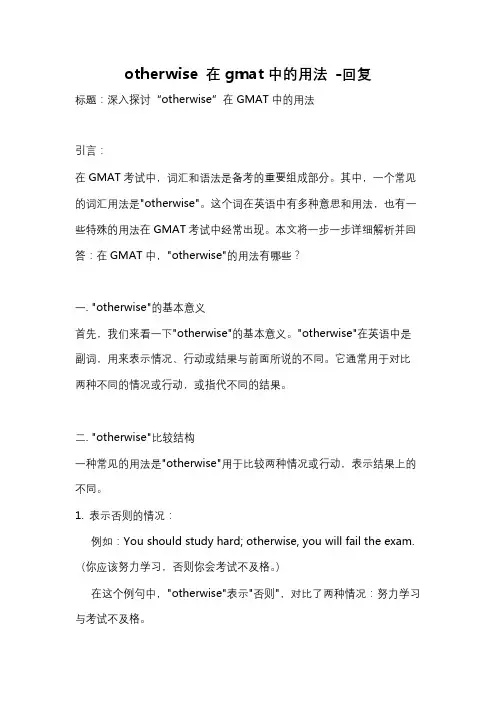
otherwise 在gmat中的用法-回复标题:深入探讨“otherwise”在GMAT中的用法引言:在GMAT考试中,词汇和语法是备考的重要组成部分。
其中,一个常见的词汇用法是"otherwise"。
这个词在英语中有多种意思和用法,也有一些特殊的用法在GMAT考试中经常出现。
本文将一步一步详细解析并回答:在GMAT中,"otherwise"的用法有哪些?一. "otherwise"的基本意义首先,我们来看一下"otherwise"的基本意义。
"otherwise"在英语中是副词,用来表示情况、行动或结果与前面所说的不同。
它通常用于对比两种不同的情况或行动,或指代不同的结果。
二. "otherwise"比较结构一种常见的用法是"otherwise"用于比较两种情况或行动,表示结果上的不同。
1. 表示否则的情况:例如:You should study hard; otherwise, you will fail the exam.(你应该努力学习,否则你会考试不及格。
)在这个例句中,"otherwise"表示"否则",对比了两种情况:努力学习与考试不及格。
2. 表示替代选择:例如:She wanted to become a doctor, but her parents thought she should pursue a different career. Otherwise, they would not support her financially.(她想成为一名医生,但她的父母觉得她应该选择不同的职业。
否则,他们不会经济上支持她。
)这个例句中,"otherwise"表示"否则",对比了两种选择:成为医生与父母不提供经济支持。
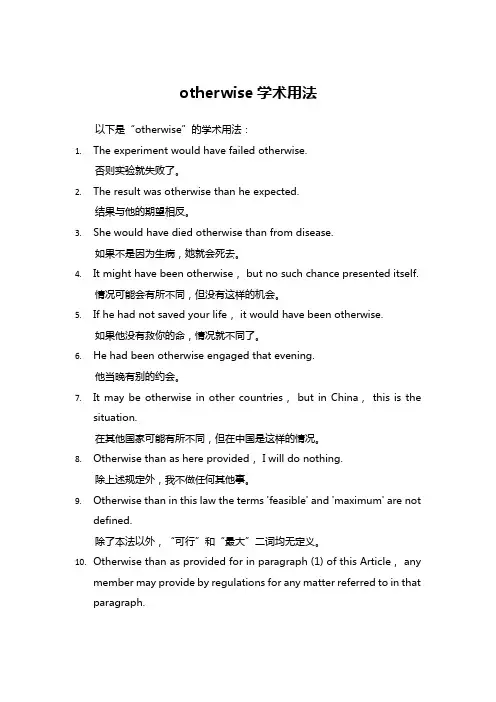
otherwise学术用法以下是“otherwise”的学术用法:1.The experiment would have failed otherwise.否则实验就失败了。
2.The result was otherwise than he expected.结果与他的期望相反。
3.She would have died otherwise than from disease.如果不是因为生病,她就会死去。
4.It might have been otherwise, but no such chance presented itself.情况可能会有所不同,但没有这样的机会。
5.If he had not saved your life, it would have been otherwise.如果他没有救你的命,情况就不同了。
6.He had been otherwise engaged that evening.他当晚有别的约会。
7.It may be otherwise in other countries,but in China,this is thesituation.在其他国家可能有所不同,但在中国是这样的情况。
8.Otherwise than as here provided, I will do nothing.除上述规定外,我不做任何其他事。
9.Otherwise than in this law the terms 'feasible' and 'maximum' are notdefined.除了本法以外,“可行”和“最大”二词均无定义。
10.Otherwise than as provided for in paragraph (1) of this Article, anymember may provide by regulations for any matter referred to in that paragraph.除本条第(1)款规定外,任何成员可通过法规对第(1)款提及的任何事项做出规定。
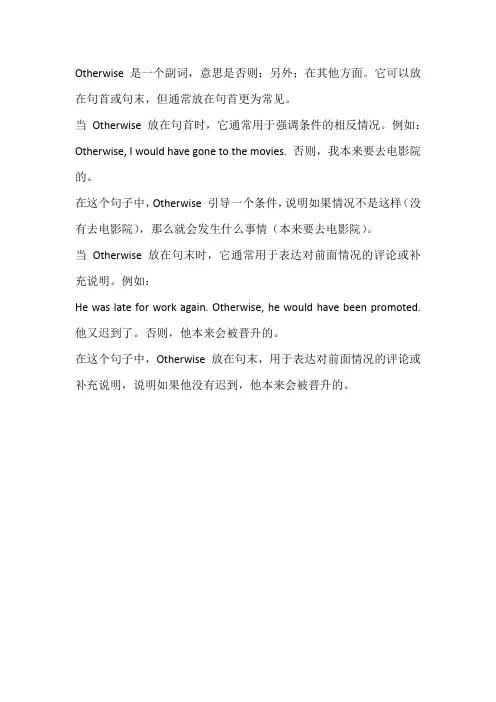
Otherwise 是一个副词,意思是否则;另外;在其他方面。
它可以放在句首或句末,但通常放在句首更为常见。
当Otherwise 放在句首时,它通常用于强调条件的相反情况。
例如:Otherwise, I would have gone to the movies. 否则,我本来要去电影院的。
在这个句子中,Otherwise 引导一个条件,说明如果情况不是这样(没有去电影院),那么就会发生什么事情(本来要去电影院)。
当Otherwise 放在句末时,它通常用于表达对前面情况的评论或补充说明。
例如:
He was late for work again. Otherwise, he would have been promoted. 他又迟到了。
否则,他本来会被晋升的。
在这个句子中,Otherwise 放在句末,用于表达对前面情况的评论或补充说明,说明如果他没有迟到,他本来会被晋升的。
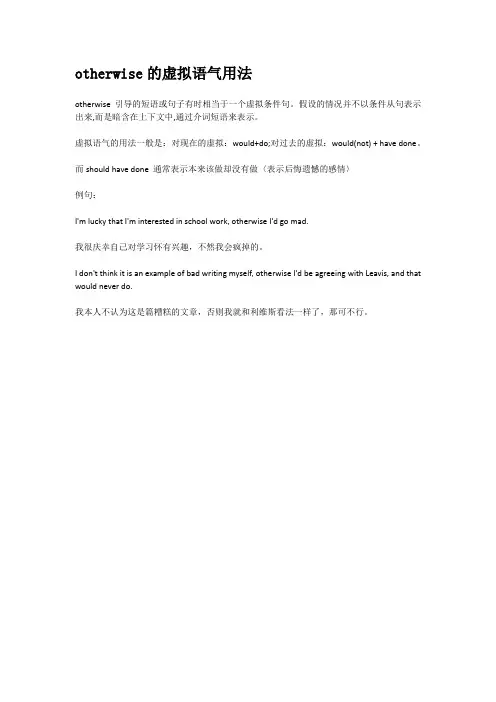
otherwise的虚拟语气用法
otherwise引导的短语或句子有时相当于一个虚拟条件句。
假设的情况并不以条件从句表示出来,而是暗含在上下文中,通过介词短语来表示。
虚拟语气的用法一般是:对现在的虚拟:would+do;对过去的虚拟:would(not) + have done。
而should have done 通常表示本来该做却没有做〈表示后悔遗憾的感情〉
例句:
I'm lucky that I'm interested in school work, otherwise I'd go mad.
我很庆幸自己对学习怀有兴趣,不然我会疯掉的。
I don't think it is an example of bad writing myself, otherwise I'd be agreeing with Leavis, and that would never do.
我本人不认为这是篇糟糕的文章,否则我就和利维斯看法一样了,那可不行。
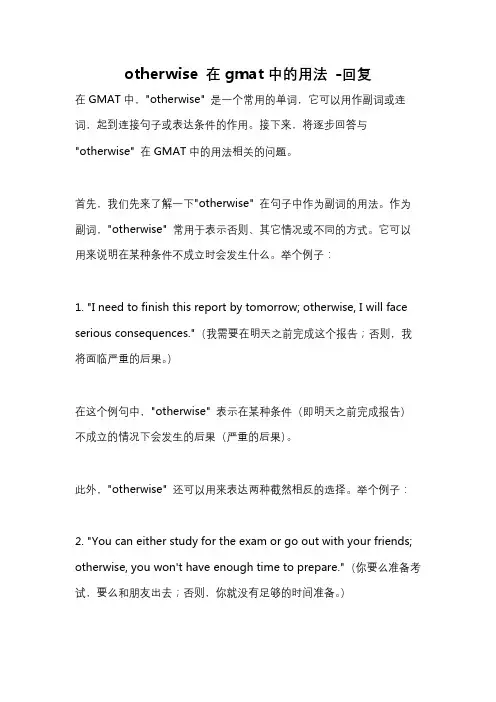
otherwise 在gmat中的用法-回复在GMAT中,"otherwise" 是一个常用的单词,它可以用作副词或连词,起到连接句子或表达条件的作用。
接下来,将逐步回答与"otherwise" 在GMAT中的用法相关的问题。
首先,我们先来了解一下"otherwise" 在句子中作为副词的用法。
作为副词,"otherwise" 常用于表示否则、其它情况或不同的方式。
它可以用来说明在某种条件不成立时会发生什么。
举个例子:1. "I need to finish this report by tomorrow; otherwise, I will face serious consequences."(我需要在明天之前完成这个报告;否则,我将面临严重的后果。
)在这个例句中,"otherwise" 表示在某种条件(即明天之前完成报告)不成立的情况下会发生的后果(严重的后果)。
此外,"otherwise" 还可以用来表达两种截然相反的选择。
举个例子:2. "You can either study for the exam or go out with your friends; otherwise, you won't have enough time to prepare."(你要么准备考试,要么和朋友出去;否则,你就没有足够的时间准备。
)在这个例句中,"otherwise" 表示除了两个对立的选择之外的其它情况,即如果你既不学习也不出去,那么你将没有足够的时间准备考试。
作为连词,"otherwise" 也可以用来连接两个句子,表示两者之间的区别或对比。
它常常用于引导结果、条件或因果关系。
举个例子:3. "He studied hard; otherwise, he wouldn't have passed the exam."(他努力学习;否则他就不会通过考试。
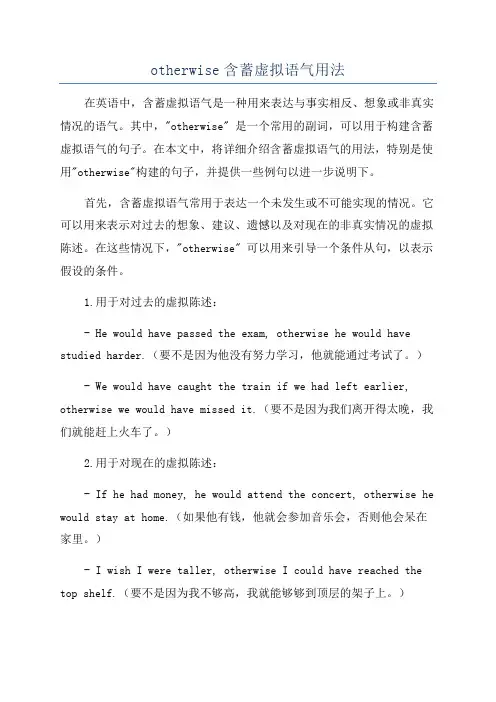
otherwise含蓄虚拟语气用法在英语中,含蓄虚拟语气是一种用来表达与事实相反、想象或非真实情况的语气。
其中,"otherwise" 是一个常用的副词,可以用于构建含蓄虚拟语气的句子。
在本文中,将详细介绍含蓄虚拟语气的用法,特别是使用"otherwise"构建的句子,并提供一些例句以进一步说明下。
首先,含蓄虚拟语气常用于表达一个未发生或不可能实现的情况。
它可以用来表示对过去的想象、建议、遗憾以及对现在的非真实情况的虚拟陈述。
在这些情况下,"otherwise" 可以用来引导一个条件从句,以表示假设的条件。
1.用于对过去的虚拟陈述:- He would have passed the exam, otherwise he would have studied harder.(要不是因为他没有努力学习,他就能通过考试了。
)- We would have caught the train if we had left earlier, otherwise we would have missed it.(要不是因为我们离开得太晚,我们就能赶上火车了。
)2.用于对现在的虚拟陈述:- If he had money, he would attend the concert, otherwise he would stay at home.(如果他有钱,他就会参加音乐会,否则他会呆在家里。
)- I wish I were taller, otherwise I could have reached the top shelf.(要不是因为我不够高,我就能够够到顶层的架子上。
)其次,含蓄虚拟语气常用于提出建议、命令或请求并暗示对方可能不会采纳。
在这种情况下,"otherwise" 可以用来表示一种假设,以示愿望或强调。
1.用于提出建议:- You should go to bed early, otherwise you'll be tired tomorrow.(你应该早点睡觉,否则你明天会很累。
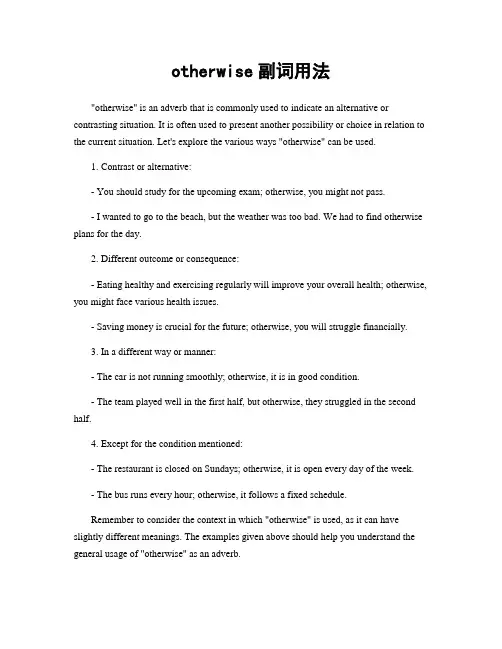
otherwise副词用法"otherwise" is an adverb that is commonly used to indicate an alternative or contrasting situation. It is often used to present another possibility or choice in relation to the current situation. Let's explore the various ways "otherwise" can be used.1. Contrast or alternative:- You should study for the upcoming exam; otherwise, you might not pass.- I wanted to go to the beach, but the weather was too bad. We had to find otherwise plans for the day.2. Different outcome or consequence:- Eating healthy and exercising regularly will improve your overall health; otherwise, you might face various health issues.- Saving money is crucial for the future; otherwise, you will struggle financially.3. In a different way or manner:- The car is not running smoothly; otherwise, it is in good condition.- The team played well in the first half, but otherwise, they struggled in the second half.4. Except for the condition mentioned:- The restaurant is closed on Sundays; otherwise, it is open every day of the week.- The bus runs every hour; otherwise, it follows a fixed schedule.Remember to consider the context in which "otherwise" is used, as it can have slightly different meanings. The examples given above should help you understand the general usage of "otherwise" as an adverb.。
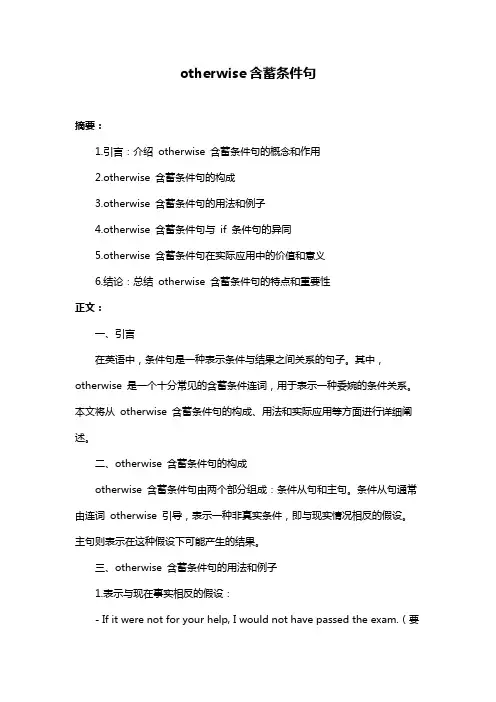
otherwise含蓄条件句摘要:1.引言:介绍otherwise 含蓄条件句的概念和作用2.otherwise 含蓄条件句的构成3.otherwise 含蓄条件句的用法和例子4.otherwise 含蓄条件句与if 条件句的异同5.otherwise 含蓄条件句在实际应用中的价值和意义6.结论:总结otherwise 含蓄条件句的特点和重要性正文:一、引言在英语中,条件句是一种表示条件与结果之间关系的句子。
其中,otherwise 是一个十分常见的含蓄条件连词,用于表示一种委婉的条件关系。
本文将从otherwise 含蓄条件句的构成、用法和实际应用等方面进行详细阐述。
二、otherwise 含蓄条件句的构成otherwise 含蓄条件句由两个部分组成:条件从句和主句。
条件从句通常由连词otherwise 引导,表示一种非真实条件,即与现实情况相反的假设。
主句则表示在这种假设下可能产生的结果。
三、otherwise 含蓄条件句的用法和例子1.表示与现在事实相反的假设:- If it were not for your help, I would not have passed the exam.(要不是你的帮助,我不会通过这个考试。
)2.表示对现在事实的推测:- If he is not feeling well, he otherwise would have come to the party.(如果他身体不适,否则他肯定会来参加派对的。
)3.表示委婉的建议或批评:- You should otherwise consider taking an umbrella with you in case it rains.(否则你要考虑带把伞,以防下雨。
)四、otherwise 含蓄条件句与if 条件句的异同与其他条件句相比,otherwise 含蓄条件句更加委婉、客气。
if 条件句则表示一种明确的条件关系,通常用于真实条件的假设。
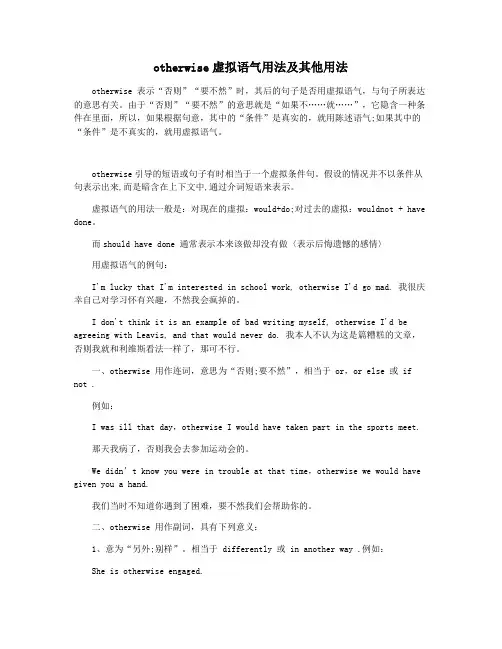
otherwise虚拟语气用法及其他用法otherwise 表示“否则”“要不然”时,其后的句子是否用虚拟语气,与句子所表达的意思有关。
由于“否则”“要不然”的意思就是“如果不……就……”,它隐含一种条件在里面,所以,如果根据句意,其中的“条件”是真实的,就用陈述语气;如果其中的“条件”是不真实的,就用虚拟语气。
otherwise引导的短语或句子有时相当于一个虚拟条件句。
假设的情况并不以条件从句表示出来,而是暗含在上下文中,通过介词短语来表示。
虚拟语气的用法一般是:对现在的虚拟:would+do;对过去的虚拟:wouldnot + have done。
而should have done 通常表示本来该做却没有做〈表示后悔遗憾的感情〉用虚拟语气的例句:I'm lucky that I'm interested in school work, otherwise I'd go mad. 我很庆幸自己对学习怀有兴趣,不然我会疯掉的。
I don't think it is an example of bad writing myself, otherwise I'd be agreeing with Leavis, and that would never do. 我本人不认为这是篇糟糕的文章,否则我就和利维斯看法一样了,那可不行。
一、otherwise 用作连词,意思为“否则;要不然”,相当于 or,or else 或 if not .例如:I was ill that day,otherwise I would have taken part in the sports meet.那天我病了,否则我会去参加运动会的。
We didn’t know you were in trouble at that time,otherwise we would have given you a hand.我们当时不知道你遇到了困难,要不然我们会帮助你的。
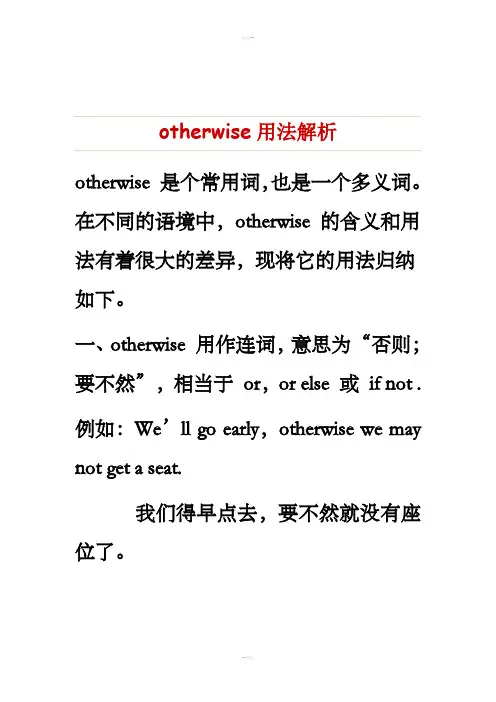
otherwise用法解析otherwise 是个常用词,也是一个多义词。
在不同的语境中,otherwise 的含义和用法有着很大的差异,现将它的用法归纳如下。
一、otherwise 用作连词,意思为“否则;要不然”,相当于or,or else 或if not .例如:We’ll go early,otherwise we may not get a seat.我们得早点去,要不然就没有座位了。
Seize the chance,otherwise you will regret it. 抓住机会,要不然你会后悔的。
I was ill that day,otherwise I would have taken part in the sports meet.那天我病了,否则我会去参加运动会的。
We didn’t know you were in trouble at that time,otherwise we would have given you a hand.我们当时不知道你遇到了困难,要不然我们会帮助你的。
二、otherwise 用作副词,具有下列意义:1. 意为“另外;别样”。
相当于differently 或in another way .例如:He evidently thinks otherwise. 他显然有不同的想法。
She is otherwise engaged. 她另外有事。
We were going to play football,but it was so hot that we decided to do otherwise.我们原打算踢足球,可是天气太热,我们就决定去干别的事情了。
2. 意为“在其他方面”。
相当于in other or different ways. 例如:The rent is high,but otherwise the house is satisfactory.房租是贵,可这房子在别的方面倒令人满意。
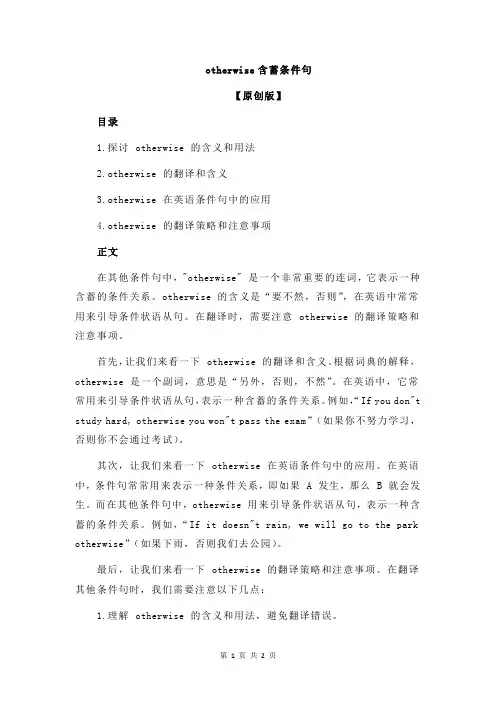
otherwise含蓄条件句【原创版】目录1.探讨 otherwise 的含义和用法2.otherwise 的翻译和含义3.otherwise 在英语条件句中的应用4.otherwise 的翻译策略和注意事项正文在其他条件句中,"otherwise" 是一个非常重要的连词,它表示一种含蓄的条件关系。
otherwise 的含义是“要不然,否则”,在英语中常常用来引导条件状语从句。
在翻译时,需要注意 otherwise 的翻译策略和注意事项。
首先,让我们来看一下 otherwise 的翻译和含义。
根据词典的解释,otherwise 是一个副词,意思是“另外,否则,不然”。
在英语中,它常常用来引导条件状语从句,表示一种含蓄的条件关系。
例如,“If you don"t study hard, otherwise you won"t pass the exam”(如果你不努力学习,否则你不会通过考试)。
其次,让我们来看一下 otherwise 在英语条件句中的应用。
在英语中,条件句常常用来表示一种条件关系,即如果 A 发生,那么 B 就会发生。
而在其他条件句中,otherwise 用来引导条件状语从句,表示一种含蓄的条件关系。
例如,“If it doesn"t rain, we will go to the park otherwise”(如果下雨,否则我们去公园)。
最后,让我们来看一下 otherwise 的翻译策略和注意事项。
在翻译其他条件句时,我们需要注意以下几点:1.理解 otherwise 的含义和用法,避免翻译错误。
2.根据上下文,判断 otherwise 所表示的含义,以避免翻译偏差。
3.注意 otherwise 与其他连词的区分,以避免翻译错误。
4.在翻译时,注意保持句子的流畅和通顺,以避免翻译腔。
总之,"otherwise" 是一个非常重要的连词,在英语中常常用来引导条件状语从句,表示一种含蓄的条件关系。
otherwise意思otherwise是一个常用的英语单词,它的意思是“否则”,“不然”,“另外”,“不同的”,“不同于”,“不一样的”,“不同的地方在于”等等。
这个单词通常用于表达一种选择或者对比,让人们明白不同的情况下会有不同的结果。
例如:- You should hurry up, otherwise you will be late for the meeting. 你应该赶快,否则你会迟到开会。
- I love this restaurant, otherwise I wouldn't come here so often. 我喜欢这家餐厅,否则我不会这么经常来这里。
- My sister is very outgoing, otherwise she wouldn't have so many friends. 我姐姐很外向,否则她不会有那么多朋友。
在以上的例句中,otherwise都是表示一种选择或者对比的意思,让人们明白在不同的情况下会有不同的结果。
除了以上的用法外,otherwise还可以用于表示“不同于”,“不一样的”,“不同的地方在于”等等。
例如:- This book is interesting, otherwise it wouldn't have won so many awards. 这本书很有趣,不然它不会赢得那么多奖项。
- The new car is faster, otherwise it wouldn't have set a new record. 这辆新车更快,不然它不会创下新纪录。
- The painting is unique, otherwise it wouldn't have beensold for such a high price. 这幅画很独特,不然它不会以这么高的价格卖出。
在以上的例句中,otherwise都是表示“不同于”,“不一样的”,“不同的地方在于”等等的意思,让人们明白这些事物的独特之处。
otherwise虚拟语气用法说到虚拟语气,人们通常会想到“if only”,但是还有许多其他的用法,其中之一就是otherwise虚拟语气。
otherwise虚拟语气,也叫做倒装祈使句,它可以让人们表达自己的假设,以及可能发生的结果。
otherwise虚拟语气是一个既可以表达陈述性句,又可以表达祈使性句的句子,句子的前半部分由一个含有otherwise翻译就是“否则”的副词开头,放在谓语动词之前,倒装句子。
例如:Otherwise, they will be late.如果不这么做,他们就会迟到。
otherwise这个副词意为“否则”,用来表达另一种可能性,也就是说如果前一件事情没有发生,另一种情况可能会发生。
而当这种情况发生的时候,就会有一些不好的结果产生。
在使用otherwise虚拟语气的时候,有时候会发现前面的句子没有明确指出结果,这时候就要仔细想想,利用之前的句子的信息来推断出可能的结果,之后再利用otherwise来表达另一种可能性。
例如:Study hard, otherwise you won pass the exam.如果你不努力学习,你可能会考试不及格。
此外,我们还可以在otherwise虚拟语气中使用被动语态,而不是直接用动词的原形表达。
例如:Take good care of yourself, otherwise you may be injured.你要好好照顾自己,否则可能会受伤。
此外,我们也可以用otherwise虚拟语气来表达一种类似于概率的说法,表达某件事情很可能不会发生,但也有可能发生的概念。
这样,我们就可以用“otherwise”来表达出某件事情不太可能发生,但也不可以排除可能性的念头。
例如:Make sure to plan ahead, otherwise there is a good chance you will miss your flight.一定要提前做些计划,否则你很有可能会错过航班。
otherwise虚拟语气的用法一般是:对现在的虚拟:would+do;对过去的虚拟:would(not)+ have done。
otherwise的虚拟语气用法otherwise引导的短语或句子有时相当于一个虚拟条件句。
假设的情况并不以条件从句表示出来,而是暗含在上下文中,通过介词短语来表示。
虚拟语气的用法一般是:对现在的虚拟:would+do;对过去的虚拟:would(not) + have done。
而should have done 通常表示本来该做却没有做〈表示后悔遗憾的感情〉例句:I'm lucky that I'm interested in school work, otherwise I'd go mad.我很庆幸自己对学习怀有兴趣,不然我会疯掉的。
I don't think it is an example of bad writing myself, otherwise I'd beagreeing with Leavis, and that would never do.我本人不认为这是篇糟糕的文章,否则我就和利维斯看法一样了,那可不行。
otherwise的用法一、otherwise 用作连词,意思为“否则;要不然”,相当于 or,or else 或 if not。
例句:I was ill that day,otherwise I would have taken part in the sports meet.那天我病了,否则我会去参加运动会的。
We didn’t know you were in trouble at that time,otherwise we would have givenyou a hand.我们当时不知道你遇到了困难,要不然我们会帮助你的。
二、otherwise 用作副词,具有下列意义:1、意为“另外;别样”。
otherwise用法总结
otherwise用作副词,表示用别的方法,不同地;用作连词,表示否则,要不然;用作形容词,表示不同的。
扩展资料
一.otherwise用作副词,表示用别的方法,不同地;
He says it's genuine, but we think otherwise.
他说这是真的,但我们不这样认为。
They should have been working, but they were otherwise engaged.
他们应该在工作,但他们却干别的事。
The soup was cold, but it was an otherwise excellent.
除了汤是凉的.以外,那顿饭菜是很好的。
二.otherwise用作连词,表示否则,要不然;
You'd better go now, otherwise you'll miss the train.
你最好现在就走,要不然就赶不上火车了。
You should be more careful, otherwise you might meet with some accident.
你应该更加小心,要不然你会出事的。
三.otherwise用作形容词,表示不同的;
The truth is quite otherwise.
实情大有出入。
四.otherwise than 除…之外
unless otherwise stated 除非另作说明...
but otherwise 但在别的方面却...。